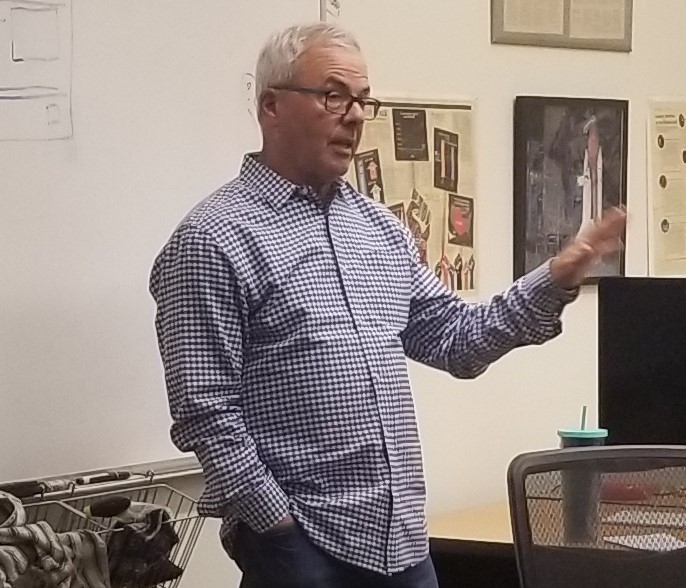Former Executive Editor at Seattle Times Visits SCC
Don Shelton lectures for a group of students at the newsroom
May 26, 2023
Don Shelton strides into The Ebbtide’s newsroom with the quiet confidence of a journalist tempered with experience. He has a comfortable demeanor and an easy smile. Shelton takes the time to greet each student individually, with the cheerful assurance that he’s unlikely to remember any names.
Shelton was invited by The Ebbtide’s adviser, Jim Davis, who wanted to connect his journalism students with the advice of someone with years of experience working for news publications. Even though 15 students sat in a semicircle, Shelton refused a chair as he preferred to stand.
Shelton got his start in journalism in his hometown of Fruitland, Idaho. He described himself as initially enthusiastic, but untalented. “I sort of fumbled my way into the field. I declared a journalism major without really knowing what that meant,” said Shelton.
He graduated from The University of Idaho in 1976 and got his first job as a sports reporter at The Yakima Herald. Shelton’s editor was frustrated by him not taking the job seriously and asked him what his long term goals were. “I said I wanted to be a Seattle Times sports editor. I had no idea what that meant. I don’t even know why it came out of my mouth, but I’m convinced that by saying it out loud, it led me to Seattle,” said Shelton.
He places a lot of emphasis on manifesting your dreams and encourages all students to write down their goals as soon as they’re realized. “I’m more positive about journalism than most people you all will talk to. I don’t think I’m crazy. I mean, maybe a little but not completely… The great thing is that you get to tell people’s stories. What a great job, to be trusted with people’s stories,” said Shelton.
Shelton worked his way up at The Seattle Times from sports reporter to sports editor. This put him on the front lines when physical newspaper circulation rates dropped about 15 years ago. Shelton embraced digitalization as the future for journalism and transitioned the sports section to be online.
This was a massive success, so he was asked to do the same for the rest of the newsroom. “Turning a sports department into a digital team, that’s like parking a smart car. It’s easy, you don’t need a lot of space and you’re getting it out fast. But doing the whole newsroom? That was like parking a semi.”
Evidently, the undertaking was a success. Shelton reports that print and digital circulation rates have almost flipped in the past 10 years. From this he divulges his ultimate advice for student journalists: The greatest strength one can have in Shelton’s eyes is adaptability.






